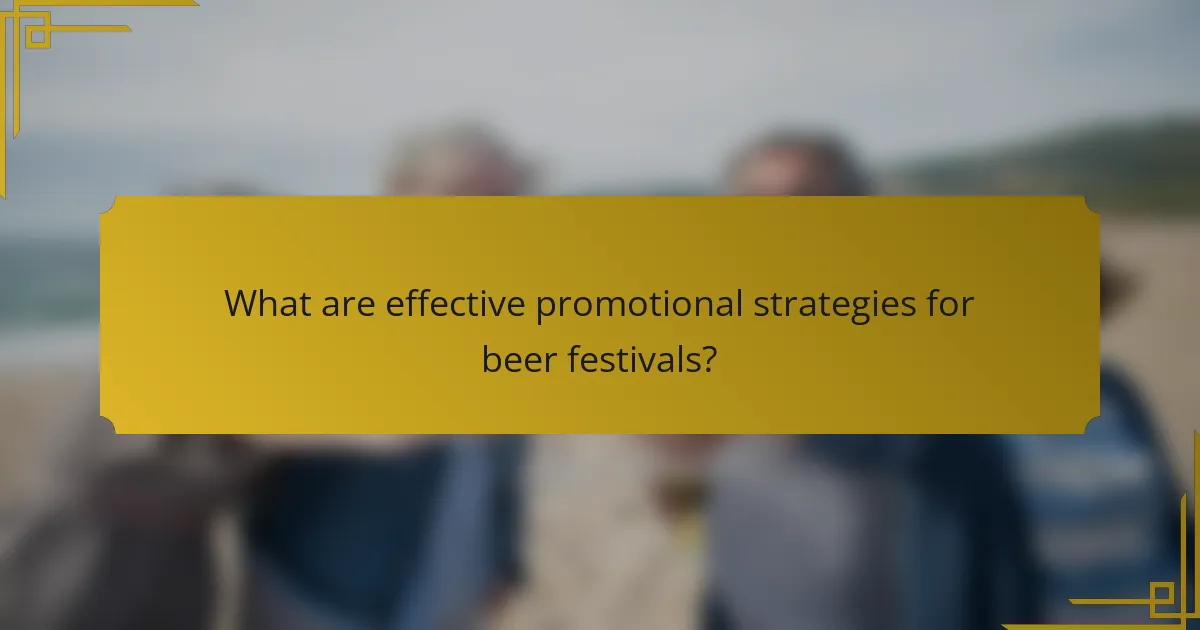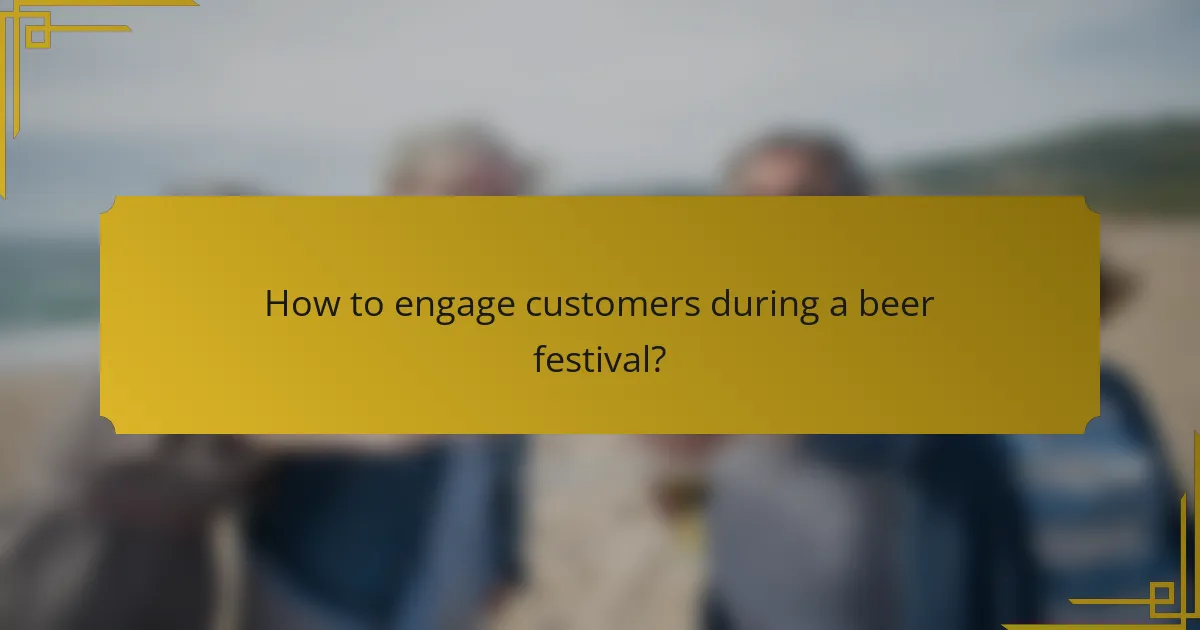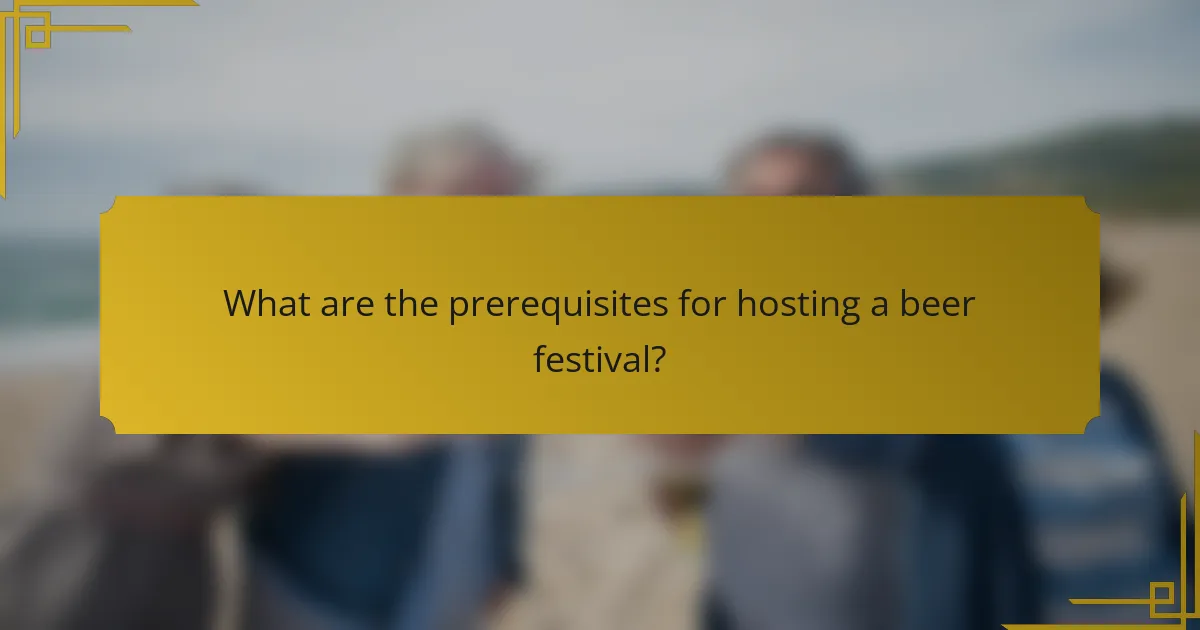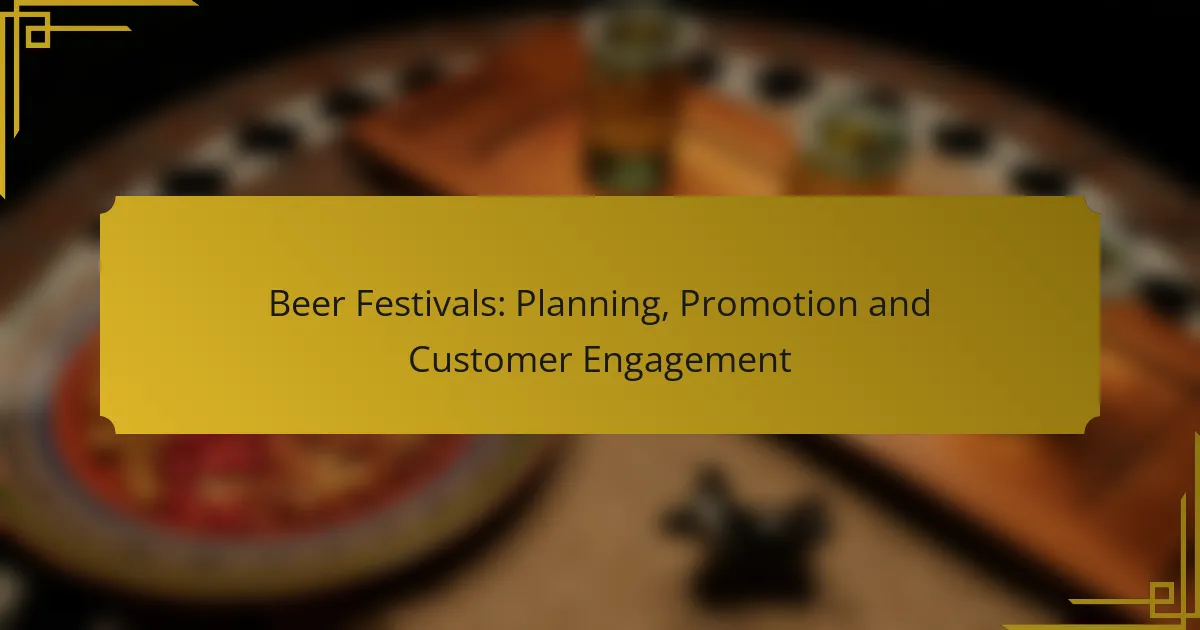Planning a successful beer festival requires meticulous attention to venue selection, permits, budgeting, and a well-structured timeline to ensure a smooth event. Promoting the festival effectively through social media, email marketing, and partnerships with local breweries can significantly boost visibility and community engagement. Additionally, fostering customer engagement during the festival through interactive experiences and exclusive offerings enhances attendee satisfaction and loyalty.

How to plan a successful beer festival in the UK?
Planning a successful beer festival in the UK involves careful consideration of venue, permits, budgeting, and a detailed timeline. Each of these elements plays a crucial role in ensuring the event runs smoothly and attracts a large audience.
Venue selection criteria
Choosing the right venue is essential for a successful beer festival. Consider factors such as location accessibility, capacity, facilities, and ambiance. A venue that is easily reachable by public transport and has enough space for attendees and vendors will enhance the overall experience.
Look for venues with outdoor space if you plan to host a larger crowd, as this can accommodate more attendees and create a festive atmosphere. Additionally, check for amenities like restrooms, parking, and food service options to ensure guest comfort.
Permits and regulations
In the UK, organizing a beer festival requires various permits and adherence to local regulations. You will need to apply for a Temporary Event Notice (TEN) if you plan to sell alcohol, which must be submitted to your local council at least 10 working days before the event.
Familiarize yourself with health and safety regulations, including food hygiene standards if food vendors are involved. It’s also wise to check for any specific local laws regarding noise and crowd control to avoid potential issues.
Budgeting essentials
Creating a detailed budget is crucial for managing costs effectively. Start by estimating expenses such as venue rental, permits, insurance, staffing, marketing, and supplies. Allocate funds for unexpected costs to avoid financial strain.
Consider potential revenue sources, including ticket sales, sponsorships, and vendor fees. A balanced budget will help you gauge the financial viability of your festival and ensure you can cover all necessary expenses.
Timeline for planning
Establishing a clear timeline is vital for organizing a beer festival. Begin planning at least six months in advance, allowing time for venue selection, securing permits, and marketing efforts. Create a checklist of tasks to ensure nothing is overlooked.
Key milestones include finalizing the venue, confirming vendors, launching marketing campaigns, and coordinating logistics. Regularly review your timeline to stay on track and adjust as needed to accommodate any changes or challenges that arise.

What are effective promotional strategies for beer festivals?
Effective promotional strategies for beer festivals include leveraging social media, email marketing, and forming partnerships with local breweries. These methods enhance visibility, engage potential attendees, and foster community connections.
Social media marketing techniques
Social media platforms are vital for promoting beer festivals, allowing organizers to reach a broad audience quickly. Create engaging content such as videos, photos, and live updates to showcase festival highlights and build excitement.
Utilize targeted ads to reach specific demographics, focusing on local beer enthusiasts. Encourage user-generated content by creating unique hashtags and running contests to increase engagement and visibility.
Email marketing campaigns
Email marketing remains a powerful tool for directly reaching potential festival-goers. Build a mailing list by offering incentives like early ticket access or exclusive merchandise to subscribers.
Craft compelling newsletters that include festival details, featured breweries, and special events. Segment your audience to tailor messages, ensuring that content resonates with different groups, such as craft beer aficionados or families.
Partnerships with local breweries
Forming partnerships with local breweries can enhance the festival’s appeal and credibility. Collaborate with breweries to feature their products, which can attract their loyal customers to the event.
Consider co-hosting events or promotional activities leading up to the festival, such as tap takeovers or brewery tours. This not only builds excitement but also strengthens community ties and encourages cross-promotion.

How to engage customers during a beer festival?
Engaging customers during a beer festival involves creating interactive experiences that enhance their enjoyment and connection to the event. Effective strategies include offering activities, gathering feedback, and providing exclusive experiences that make attendees feel valued.
Interactive activities and games
Incorporating interactive activities and games can significantly enhance customer engagement at a beer festival. Consider setting up beer tasting challenges, trivia contests, or even a scavenger hunt that encourages attendees to explore different booths.
These activities not only entertain but also foster social interaction among guests. Offering small prizes, such as branded merchandise or drink vouchers, can further incentivize participation and create a lively atmosphere.
Customer feedback collection methods
Collecting customer feedback during the festival is crucial for understanding attendee experiences and preferences. Utilize methods such as quick surveys via mobile apps, feedback stations with tablets, or simple paper forms placed at various locations.
Incentivizing feedback with discounts on future events or free merchandise can encourage more attendees to share their thoughts. Aim for concise questions that focus on key aspects like beer variety, event organization, and overall satisfaction.
VIP experiences and packages
Offering VIP experiences and packages can elevate customer engagement by providing exclusive benefits. Consider creating a VIP area with comfortable seating, premium beer selections, and personalized service to make attendees feel special.
Packages could include early access to the festival, meet-and-greet opportunities with brewers, or exclusive tastings. Pricing these packages reasonably can attract a broader audience while enhancing the overall festival experience.

What are the key metrics for measuring festival success?
Key metrics for measuring festival success include attendance numbers, customer satisfaction scores, and revenue generated. These indicators provide insights into how well the festival met its goals and the overall experience for attendees.
Attendance and ticket sales
Attendance and ticket sales are fundamental metrics that reflect the festival’s popularity and market reach. Tracking the number of tickets sold compared to previous years can help gauge growth and identify trends.
Consider offering early bird pricing or group discounts to boost sales. Monitoring ticket sales in real-time can also help adjust marketing strategies to maximize attendance.
Customer satisfaction scores
Customer satisfaction scores are essential for understanding the attendee experience. Surveys conducted during or after the festival can provide valuable feedback on various aspects, such as venue, amenities, and overall enjoyment.
Aim for a satisfaction score of at least 80% to indicate a successful event. Use this feedback to make improvements for future festivals, addressing any common concerns raised by attendees.
Revenue generated
Revenue generated is a critical metric that encompasses ticket sales, merchandise, and sponsorships. Analyzing revenue streams helps determine the financial viability of the festival and informs budget planning for subsequent events.
To maximize revenue, consider diversifying income sources, such as food and beverage sales, vendor fees, and partnerships with local businesses. Tracking revenue against expenses will provide a clearer picture of profitability and areas for improvement.

What are the prerequisites for hosting a beer festival?
Hosting a beer festival requires careful planning, knowledge of local regulations, and a clear understanding of your target audience. Key prerequisites include compliance with legal requirements, effective marketing strategies, and securing financial support through sponsorships.
Understanding local laws
Before organizing a beer festival, familiarize yourself with local laws regarding alcohol sales, permits, and health regulations. Each region may have specific licensing requirements, such as obtaining temporary event permits or adhering to age restrictions for attendees.
Consult local authorities or legal experts to ensure compliance. This can prevent costly fines or last-minute cancellations. For example, some areas may require a certain number of security personnel based on expected attendance.
Identifying target audience
Identifying your target audience is crucial for tailoring the festival experience. Consider demographics such as age, interests, and local beer culture to create an appealing event. For instance, craft beer enthusiasts may appreciate unique brews and educational workshops.
Engage with potential attendees through surveys or social media to gather insights on their preferences. This information can guide decisions on beer selection, entertainment, and food options, ensuring a successful turnout.
Securing sponsorships
Securing sponsorships can significantly enhance your festival’s budget and offerings. Approach local breweries, businesses, and brands that align with your event’s theme. Offer them promotional opportunities in exchange for financial support or in-kind donations.
Create a sponsorship proposal that outlines benefits, such as brand visibility and access to a targeted audience. Consider different sponsorship tiers to accommodate various budgets, ensuring that even smaller businesses can participate and gain exposure.
